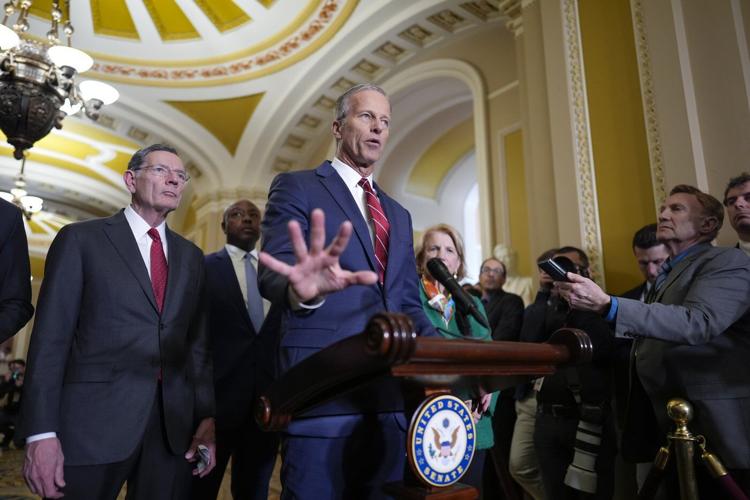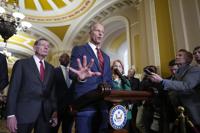WASHINGTON (AP) — Senators dived into a contentious late night — or all-night — debate Friday over a Republican budget plan that's central to President Donald Trump's agenda for trillions of dollars in tax breaks and boosts to border security and defense spending, all while slashing other government spending.
It could not have come at a more difficult political moment. The over Trump's vast tariff scheme , and experts are warning of soaring costs for consumers at home and threats of a potential recession. Even some .
But GOP leaders are determined to march ahead, pushing past a hardened line of opposition from Democrats, who are unified as they decry tax breaks for the wealthy at the expense of federal programs Americans rely on. Approval, expected by Saturday morning, would give Republicans the chance in coming months to muscle a tax cut bill through both chambers of Congress, just as they did in Trump’s first term.
“Let the voting begin," said Senate Majority Leader John Thune, R-S.D.
The evening kicked off what's called vote-a-rama as Democrats are intent on making the effort as politically painful as possible, with all-night votes on dozens of amendments to the package that GOP senators will have to defend before next year’s midterm elections. Among them are proposals to ban tax breaks for the super-wealthy and to halt Trump’s and efforts to the federal government.
Democrats accused Republicans of laying the groundwork for increasing deficits and cutting key safety net programs such as Medicaid and nutritional assistance to help pay for tax cuts they say disproportionately benefit the rich.
Senate Democratic Leader Chuck Schumer of New York said, “Trump's policies are a disaster," as is Elon Musk's Department of Government Efficiency. “Republicans could snuff it out tonight, if they wanted.”
None of the many proposals from Democrats are expected to pass as Republicans use their majority to swat them back. The Republicans are framing their work as preventing a tax increase for most American families, arguing that unless Congress acts, the individual and estate tax cuts that Republicans in 2017 will expire at the end of this year.
Sen. John Barrasso, the No.-2 ranking GOP senator, said voters gave Republicans a mission and a mandate in November, and the Senate budget plan delivers.
“It fulfills our promises to secure the border, to rebuild our economy and to restore peace through strength,” Barrasso said.
Throughout the day, the debate was generally one-sided, as Democrats were taking full advantage of 25 hours of their available debate time, while Republicans yielded much of theirs in order to get to the all-night voting frenzy.
Sen. Adam Schiff, D-Calif, warned that Trump and Musk “do not care about you. They care about their billionaire buddies.”
One Republican, Sen. Bill Cassidy of Louisiana, expressed his own misgivings about tax breaks adding to the federal deficits and said he has assurances that Trump officials would seek the cuts elsewhere.
“This vote isn’t taking place in a vacuum,” he said, a nod to the turmoil over Trump's tariffs.
And Republican Sen. Rand Paul of Kentucky, the lone vote of opposition to the plan so far, questioned the math being used by his colleagues that he said would pile on the debt load. “Something's fishy,” he said.
If the Senate is able to to approve the measure, as expected, it next goes to the House, where Speaker Mike Johnson has already approved his chamber's version and will need to hold his slim majority together to merge the two plans.
The House budget plan provided for $4.5 trillion in tax breaks over 10 years, though the amount for tax breaks would shrink if the spending cut totals don’t get to $2 trillion in savings.
The Senate’s budget plan allows for extending the tax cuts under a scoring method that treats them as not adding to future deficits, even though a new estimate from the Joint Committee on Taxation projects they will add $5.5 trillion over the next decade when including interest, and $4.6 trillion not including interest.
On top of that, the budget plan allows an additional $1.5 trillion to include some of Trump’s campaign promises, such as no taxes on tips, Social Security benefits and overtime. Republicans are also looking to increase the $10,000 deduction for state and local taxes, something that lawmakers from states such as New York, California and New Jersey say is necessary to get their support.
Committees are also given authority to pursue as much as $521 billion to boost border security, defense and the Coast Guard, though Budget Committee Chairman Lindsey Graham, R-S.C., has said the final spending total will be closer to $345 billion.
The budget plan also allows the Senate to increase the debt ceiling by up to $5 trillion. Final approval of such an increase would allow the federal government to continue to finance its debts and push any further votes on the matter until after next year’s midterm elections. Trump is wary of giving Democrats the chance to extract concessions on a debt ceiling vote.
The plan also instructs four Senate committees to find at least $1 billion each in budget reductions. That's just a small fraction of the potential tax relief. But the leadership is emphasizing that the instructions purposefully set a low floor for spending cuts to provide maximum flexibility and that committees will be on the hunt for far more.
Already, the GOP leaders are confronting concerns from fiscal hawks in deep red states and congressional districts who want trillions of dollars in spending cuts to help pay for the tax breaks. At the same time, dozens of lawmakers in swing districts and states are worried about what those cuts will mean for their constituents, and for their reelection chances.
The GOP leadership has encouraged members to just get a budget plan over the finish line, saying they have time to work out the tough questions of which tax breaks and spending cuts to include.
Throughout the debate, Democrats focused on framing the tax cuts as helping out the wealthiest at the expense of average Americans. Sen. Jeff Merkley, the lead Democrat on the Senate Budget Committee, spoke with a sign behind him that read “Republican Plan: Families Lose, Billionaires Win.”
“That's a terrible plan,” Merkley said.
Extending the the 2017 breaks would cut taxes for about three-quarters of households but raise them for about 10%. In 2027, about 45% of the benefit of all the tax cuts would go to those making roughly $450,000 or more, to the Urban-Brookings Tax Policy Center, which analyzes tax issues.


















































